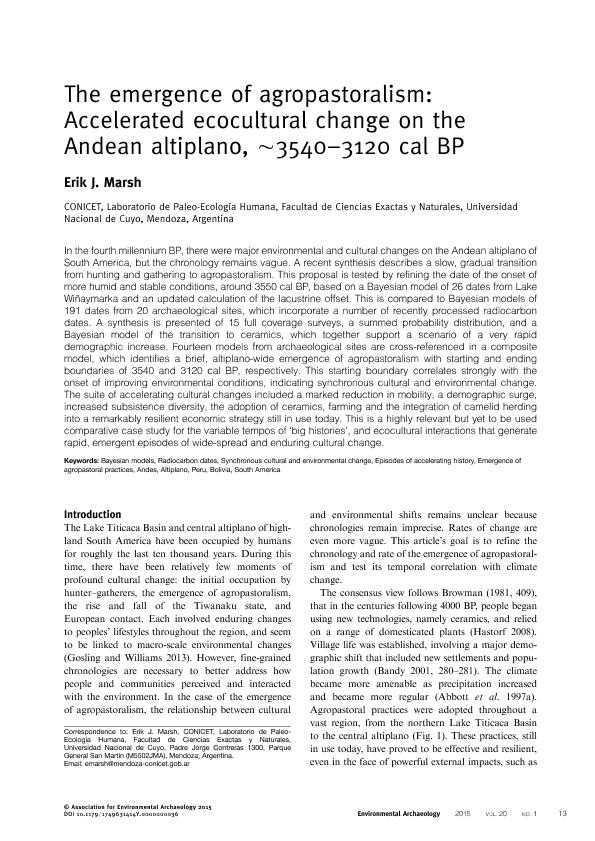Mostrar el registro sencillo del ítem
dc.contributor.author
Marsh, Erik Johnson

dc.date.available
2018-09-14T18:44:40Z
dc.date.issued
2015-02
dc.identifier.citation
Marsh, Erik Johnson; The emergence of agropastoralism: Accelerated ecocultural change on the Andean altiplano, ∼3540-3120 cal BP; Maney Publishing; Environmental Archaeology; 20; 1; 2-2015; 13-29
dc.identifier.issn
1749-6314
dc.identifier.uri
http://hdl.handle.net/11336/59755
dc.description.abstract
In the fourth millennium BP, there were major environmental and cultural changes on the Andean altiplano of South America, but the chronology remains vague. A recent synthesis describes a slow, gradual transition from hunting and gathering to agropastoralism. This proposal is tested by refining the date of the onset of more humid and stable conditions, around 3550 cal BP, based on a Bayesian model of 26 dates from Lake Wiñaymarka and an updated calculation of the lacustrine offset. This is compared to Bayesian models of 191 dates from 20 archaeological sites, which incorporate a number of recently processed radiocarbon dates. A synthesis is presented of 15 full coverage surveys, a summed probability distribution, and a Bayesian model of the transition to ceramics, which together support a scenario of a very rapid demographic increase. Fourteen models from archaeological sites are cross-referenced in a composite model, which identifies a brief, altiplano-wide emergence of agropastoralism with starting and ending boundaries of 3540 and 3120 cal BP, respectively. This starting boundary correlates strongly with the onset of improving environmental conditions, indicating synchronous cultural and environmental change. The suite of accelerating cultural changes included a marked reduction in mobility, a demographic surge, increased subsistence diversity, the adoption of ceramics, farming and the integration of camelid herding into a remarkably resilient economic strategy still in use today. This is a highly relevant but yet to be used comparative case study for the variable tempos of 'big histories', and ecocultural interactions that generate rapid, emergent episodes of wide-spread and enduring cultural change.
dc.format
application/pdf
dc.language.iso
eng
dc.publisher
Maney Publishing
dc.rights
info:eu-repo/semantics/openAccess
dc.rights.uri
https://creativecommons.org/licenses/by-nc-sa/2.5/ar/
dc.subject
Altiplano
dc.subject
Andes
dc.subject
Bayesian Models
dc.subject
Bolivia
dc.subject
Emergence of Agropastoral Practices
dc.subject
Episodes of Accelerating History
dc.subject
Peru
dc.subject
Radiocarbon Dates
dc.subject
South America
dc.subject
Synchronous Cultural And Environmental Change
dc.subject.classification
Historia

dc.subject.classification
Historia y Arqueología

dc.subject.classification
HUMANIDADES

dc.title
The emergence of agropastoralism: Accelerated ecocultural change on the Andean altiplano, ∼3540-3120 cal BP
dc.type
info:eu-repo/semantics/article
dc.type
info:ar-repo/semantics/artículo
dc.type
info:eu-repo/semantics/publishedVersion
dc.date.updated
2018-09-14T14:14:35Z
dc.journal.volume
20
dc.journal.number
1
dc.journal.pagination
13-29
dc.journal.pais
Reino Unido

dc.journal.ciudad
Londres
dc.description.fil
Fil: Marsh, Erik Johnson. Consejo Nacional de Investigaciones Científicas y Técnicas; Argentina. Universidad Nacional de Cuyo. Facultad de Ciencias Exactas y Naturales. Laboratorio de Paleoecología Humana; Argentina
dc.journal.title
Environmental Archaeology
dc.relation.alternativeid
info:eu-repo/semantics/altIdentifier/doi/https://dx.doi.org/10.1179/1749631414Y.0000000036
dc.relation.alternativeid
info:eu-repo/semantics/altIdentifier/url/https://www.tandfonline.com/doi/full/10.1179/1749631414Y.0000000036
Archivos asociados
